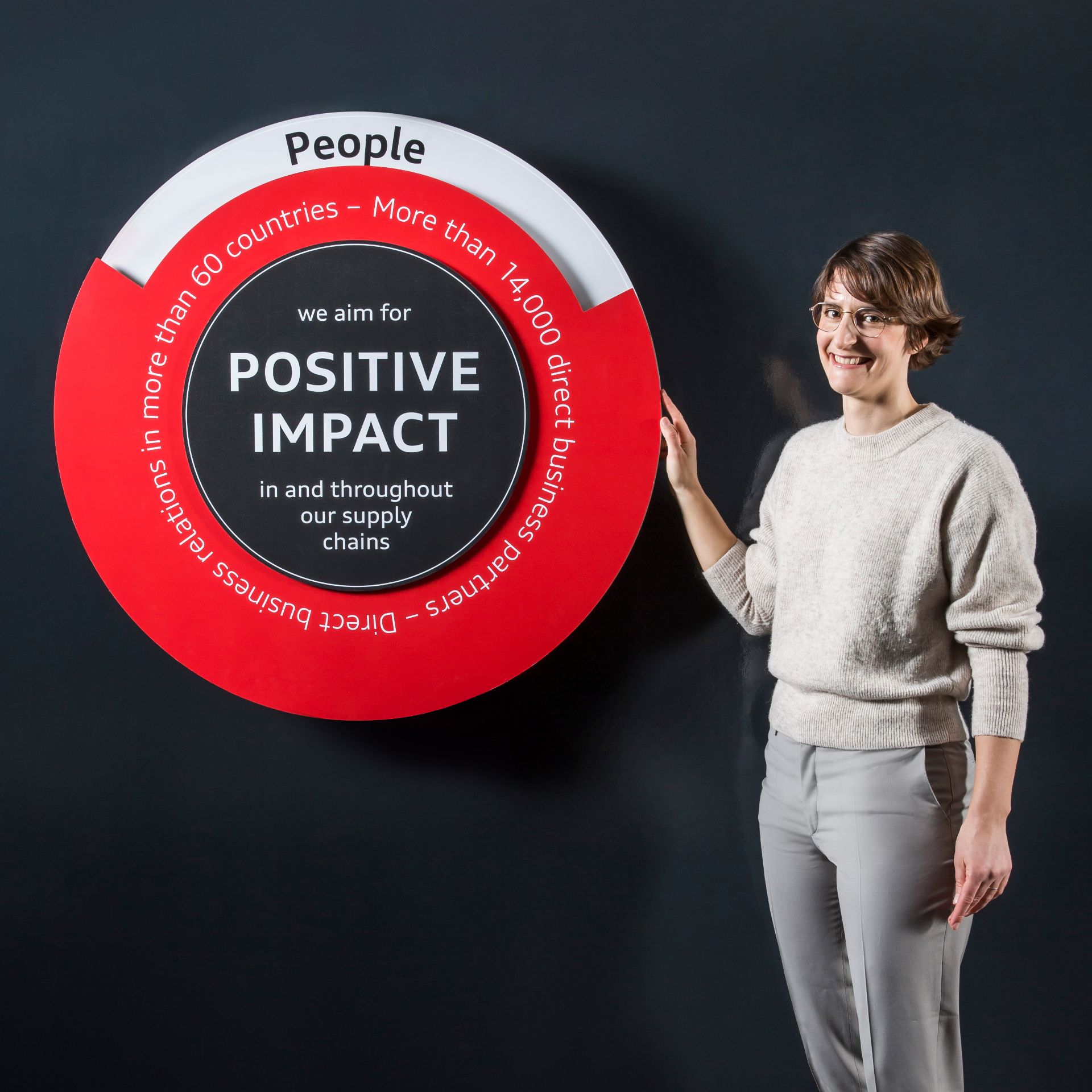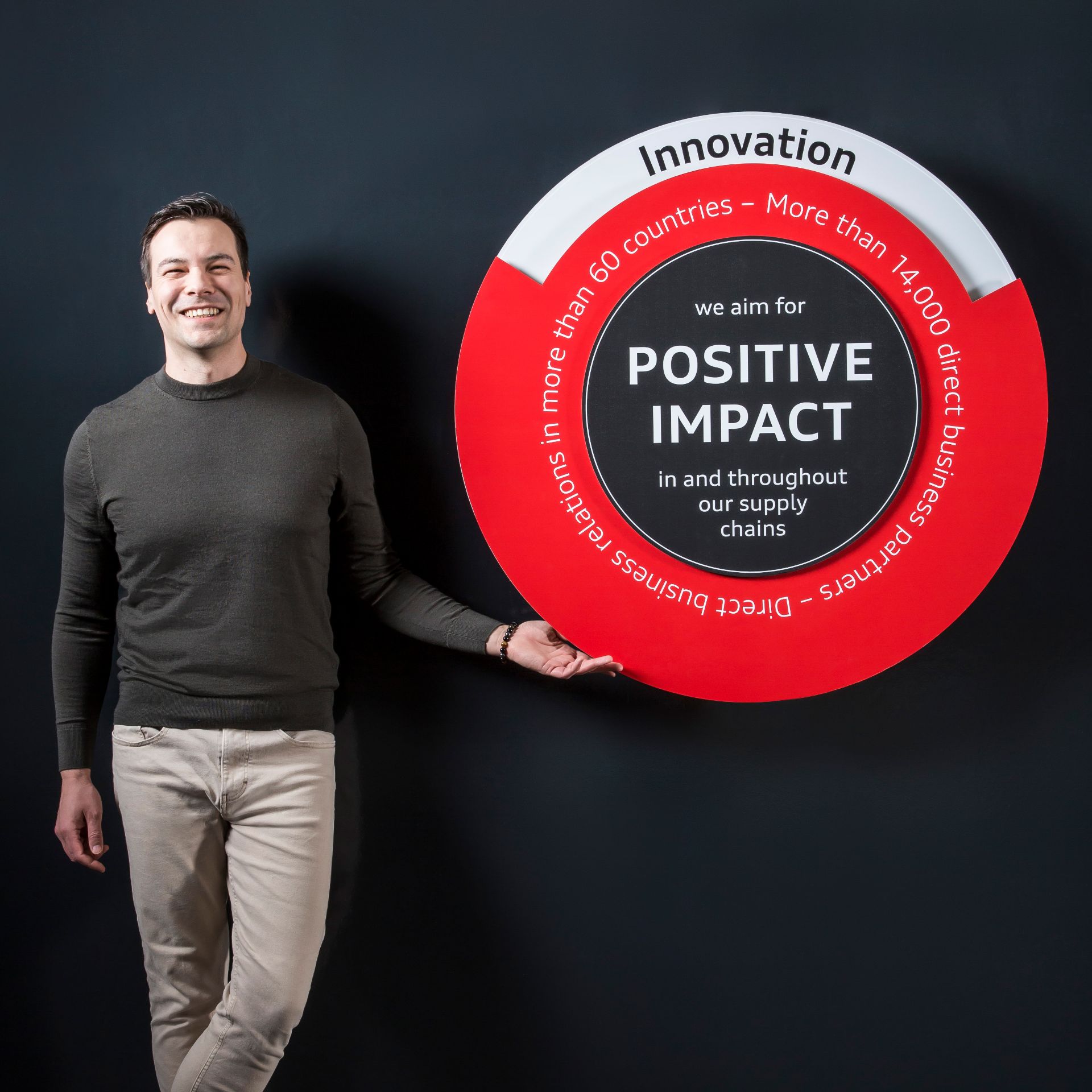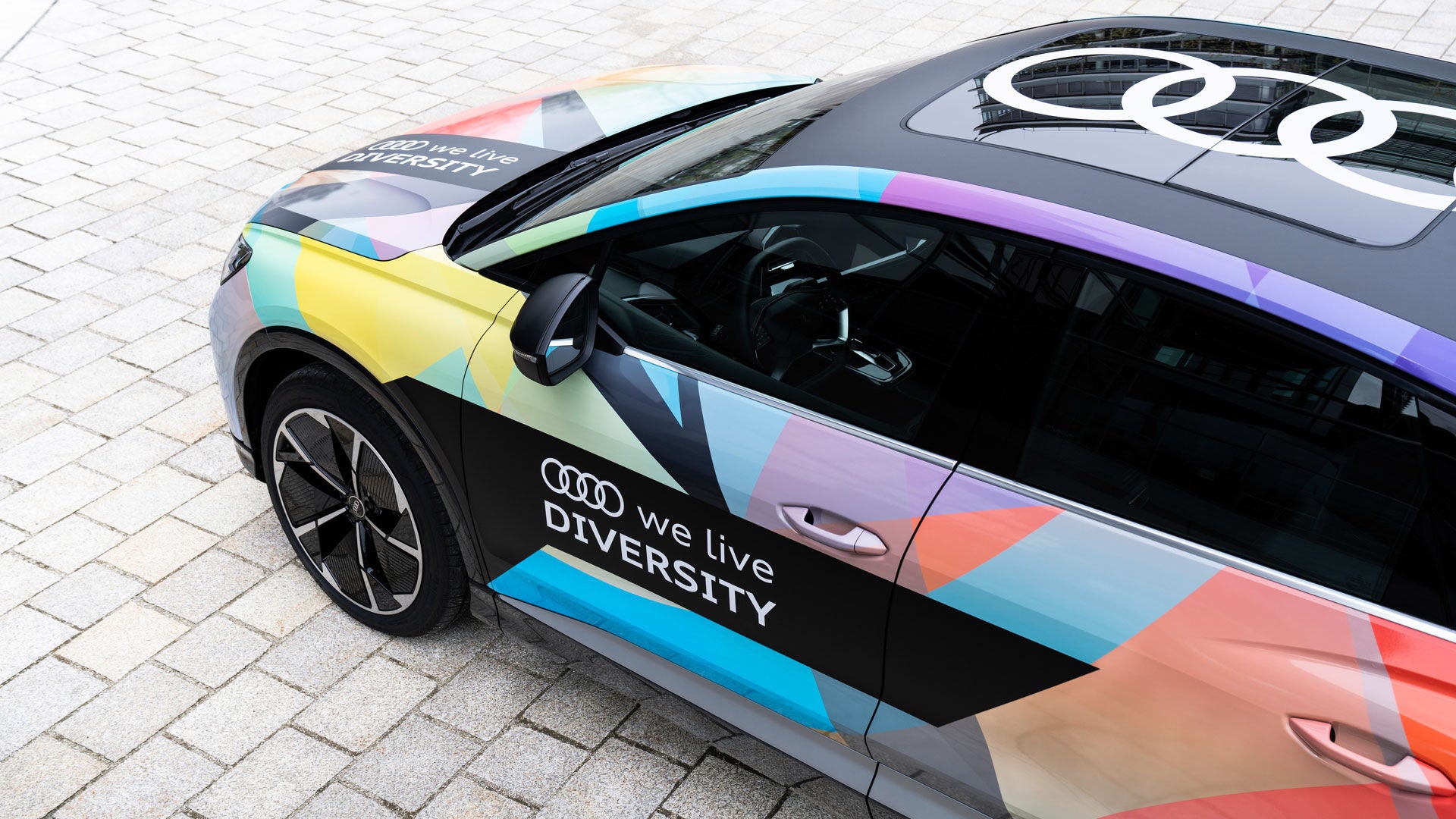Respecting human rights – protecting the environment
missing translation: fa.article-intro.reading-time – 03/16/2024
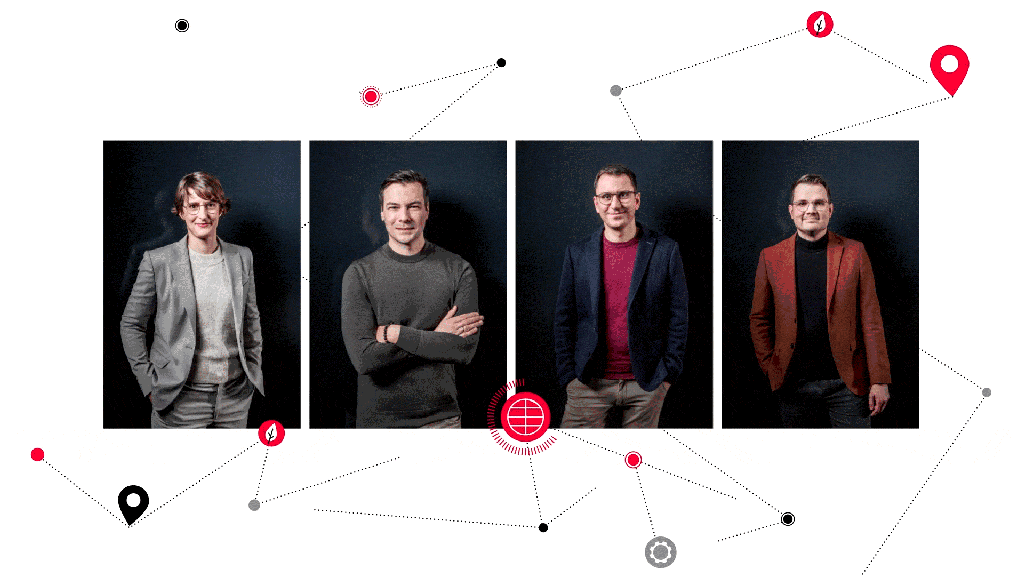
Experts on the subject „Sustainability Supply Chain: Johanna Klewitz, Lukas Petersik, Roland Dieling and Felix Homfeldt:
Experts on the subject „Sustainability Supply Chain: Johanna Klewitz, Lukas Petersik, Roland Dieling and Felix Homfeldt:
Every Audi vehicle produced leaves a footprint. And we are responsible for ensuring that this footprint is not only as small as possible but – where possible – also has a positive effect,” says Bernd Zielke, Head of Procurement Management. A modern vehicle contains around 3,000 to 5,000 parts on average from many different suppliers. This clearly shows the extent of the scope of responsibility that lies with procurement employees at Audi.
Bernd Zielke: “Our strategic goal is to have a positive impact on people and the environment through our method of corporate governance – not only in the case of our direct suppliers but also along their supply chain. That is why we are initiating far-reaching positive changes throughout the entire manufacturing process – from raw materials through to the finished car.”
But with which structures and measures can Audi achieve this goal in the widely branched supply chain? “We have divided the topic into three fields of action: people, innovation and environment,” explains procurement strategist Marco Philippi. “And through each of these areas we plan to positively change the status quo in the supply chain together with our partners. Collaboration is essential because it is only by working with our partners and their partners that we will be able to minimize risks throughout the supply chain, if possible reducing negative consequences and having a positive impact.”

Three fields of action for a sustainable supply chain
An Audi consists of many thousands of individual parts, requires a complex manufacturing process and is based on widely branched global supply chains. Potential environmental and social risks, such as CO2 emissions or working conditions along battery supply chains, increase the complexity of supply chain management. The company aspires to manage its supply chains responsibly to generate effective results for the environment and people. Doing so means analyzing and understanding potential social and environmental risks in the supply chains and then taking appropriate measures to mitigate or avoid them. At the same time, Audi views its supply chain as an opportunity to have a positive impact on people and the environment. This ambition is the basis for the strategy on responsible supply chain management, which falls under the responsibility of the “Sustainability Supply Chain” department within the Procurement division. Three fields of action give concrete form to this ambition:
People: Audi is continuously working to improve working conditions for people, for example when handling critical raw materials in the supply chain.
Environment: Audi develops standards aimed at ensuring compliance with environment-related requirements in the supply chain.
Innovation: by increasingly integrating new technologies such as artificial intelligence, Audi aims to continually increase traceability in its complex global supply chains.
Social responsibility, in particular, has become even more important since the German Supply Chain Due Diligence Act (LkSG) came into force in Germany in January 2023. The act (see box) is derived from the United Nations Guiding Principles on Business and Human Rights.
Field of action: people
Audi recognizes its corporate responsibility for human rights and takes its lead from the UN Guiding Principles on Business and Human Rights. The foundations of any collaboration are the contracts that Audi enters into with its suppliers – and this is where human rights and other social aspects play an important role.
Any company that wishes to work with Audi must comply with the binding principles of the Code of Conduct for Business Partners of the Volkswagen Group (CoC). This Code of Conduct sets out clear requirements for Audi business partners in terms of compliance, the environment and social issues, and also forms the basis for the sustainability rating (S-Rating). A positive S-Rating is a basic prerequisite for entering into a business relationship with Volkswagen AG or a Group brand. All companies of the Volkswagen Group follow the same S-Rating process – and Audi is no exception. With the help of the S-Rating, Audi assesses the environmental and social performance of suppliers using sustainability criteria. The S-Rating is calculated on the basis of the suppliers’ production locations and is mandatory for all relevant companies that wish to enter into a business relationship with Audi. It is required for any company that has more than ten employees at its production location. Microenterprises with fewer than ten employees can be exempted from having to comply with the S-Rating requirement. A self-assessment questionnaire (SAQ), standardized for the automotive industry, forms the basis for the S-Rating. The evaluation is based on the answers provided by the suppliers. By the end of the reporting period on December 31, 2022, a total of around 16,000 suppliers had completed an SAQ for the S-Rating.
Regardless of the result, the SAQ is helpful in identifying and actively addressing shortcomings and deficiencies. To this end, the SAQ offers concrete suggestions to suppliers in order to improve their results. Some 6,700 suppliers doing business with the Volkswagen Group in the year under review were able to improve their ratings during the year based on their self-assessment questionnaires. If a supplier’s answers in the SAQ do not result in a positive rating, an additional on-site check can be arranged at the supplier’s production location. The purpose of this on-site check is, among other things, to verify on the spot the working conditions and information provided by employees in the course of interviews. As a supplementary inspection tool, the on-site check is only necessary if the result of the self-assessment falls short of a certain score threshold so that the risk limit is exceeded. In the year under review, 252 on-site checks were carried out in the Volkswagen Group. If violations are discovered, the suppliers are obliged to address these. If more than one discrepancy is found, this may result in a re-audit. In extreme cases, the business relationship may be terminated.
A further important tool of responsible supply chain management is the Supply Chain Grievance Mechanism (SCGM). This is applied when there is evidence of a potential violation of the Code of Conduct for Business Partners by a supplier. Information may be reported at any time via the Whistleblower System at whistleblower-office@audi.de. In the period under review, 145 reports of violations were processed in the Volkswagen Group using the Supply Chain Grievance Mechanism. A total of four suppliers were blocked temporarily for new awards of contract due to serious violations.
These measures are complemented by, for example, the Raw Materials Due Diligence Management System (RMDDMS) of the Volkswagen Group. Since 2021, the Volkswagen Group has reported annually in the “Responsible Raw Materials Report” on status, progress and targets. The RMDDMS focuses on 16 raw materials such as cobalt, leather or aluminum. The potential risk of human rights violations is especially high in the extraction and production processes of these materials. The RMDDMS helps to identify, assess and minimize these risks on the basis of the five stages of the “Due Diligence Guidance for Responsible Business Conduct” of the OECD and the requirements of the “OECD Due Diligence Guidance for Responsible Supply Chains of Minerals from Conflict-Affected and High-Risk Areas.”
Overview of the Act on Corporate Due Diligence in Supply Chains
More details
Applies since January 1, 2023, to companies based in Germany with 3,000 or more employees and from 2024 to companies with 1,000 or more employees.
Governs compliance with human rights and environmental obligations in the upstream and downstream value chains as well as in the company’s own business operations.
Punishes violations with fines and penalties (up to two percent of consolidated annual sales) and exclusion from public contract awards.
The Volkswagen Group and its subsidiaries share responsibility for the focus raw materials. This makes it possible to leverage synergies and, at the same time, establish uniform standards for supply chain management. Within the RMDDMS, Audi is responsible for devising risk-mitigating measures and the risk analysis for the raw material aluminum.
This role also has historic reasons. AUDI AG has already been a member of the Aluminium Stewardship Initiative (ASI) since 2013 and, using the “Chain of Custody"* standard, follows an approach that is aimed at the sustainable production of aluminum along the entire value chain. All members of the initiative ensure, for example, respect for human rights throughout the value chain and collaborate in developing joint solutions and measures to achieve this. Representatives of indigenous peoples who live close to bauxite mines are an integral part of the ASI organizational structure. Dialogue with trade union representatives also plays an important role.
The measures listed above are an integral part of the “Responsible Supply Chain” system (ReSC system) for procurement processes developed jointly with the Volkswagen Group in the reporting year (Volkswagen AG Sustainability Report 2022). The ReSC system is mandatory and must be implemented worldwide by all brands of the Volkswagen Group. It is incorporated in all relevant policies of the Group and its brands. Using a systematic risk analysis, the Volkswagen Group aims to eliminate or mitigate human rights risks along its supply chain, put an end to any violations and continuously improve the sustainability performance of suppliers.
However, in the context of supply chain management, respect for the fundamental rights of others is not only important with regard to working conditions. The Audi “Supplier Diversity & Inclusion” initiative focuses on social and economic participation. The objective of this initiative is to make the supply chains more diverse. To this end, the initiative identifies companies on the basis of two criteria. First, they create added value at the social level by offering solutions for social or ecological challenges (social businesses). Second, they are managed by members of under-represented groups (minority-owned business), such as women, people with disabilities, BIPoC*, members of the LGBT_IQ community* or others. Furthermore, Audi has entered into a partnership with Yunus Social Business, the global organization for social innovation. As a participant in its “Unusual Partners” program, Audi is advocating for greater integration of social businesses in the value chain by endeavoring to engage social businesses more often in the future, thus promoting diversity in the supply chain.
Another focus of the “Unusual Partners” program – besides the search for suitable social businesses for Audi – is capacity building. Online training courses for suppliers and Audi employees on the topic of social procurement are already being implemented. Social innovations can thus become a lever for making the supply chain more diverse.
Field of action: innovation
Innovations are not only relevant for supply chain management at a social level, however. A glance at the field of action innovation shows the diversity of the approaches.
With the Act4Impact sustainability initiative, the company is developing a network of key partners to collaborate on solutions for a more sustainable supply chain.
For example, a special online training portfolio on the topic of sustainability was established for this purpose, which is intended primarily for employees of suppliers of the Volkswagen Group. From this target group, around 3,000 participants completed this training in 2022 alone. Audi has also devised the Act4Impact Playbook. Each chapter of this manual aims to show the suppliers possible ways to improve sustainability and to inspire them to develop suitable processes and practices themselves.
Field of action: environment
From an environmental point of view, sustainability in the supply chain means, among other things, ensuring that all processes emit as little CO₂ as possible – even before a part reaches Audi.
In 2018, the company launched a CO₂ program in the supply chain. The “Sustainability Supply Chain” team is closely involved in the resulting decarbonization activities of the company as a whole. The measures adopted with suppliers support the higher-level corporate goal of reducing Audi’s carbon emissions over the entire life cycle of an Audi vehicle by 40 percent by 2030 relative to the starting year of 2018. This progress made is measured using what is referred to as the decarbonization index*.
Audi is addressing CO₂ hotspots to ensure a targeted approach to decarbonization. Together with its DCI process partners in the company, the “Sustainability Supply Chain” team has identified certain materials and parts that are expected to have the highest savings potential. The biggest emissions driver in the supply chain for an electric vehicle is the high-voltage battery, followed by parts made of aluminum and steel. Together, parts from these three categories generally account for more than half of the carbon footprint. Most CO₂ emissions are not attributable to direct suppliers, however, but occur in the upstream production processes.
Together with the companies involved in these upstream production processes, Audi therefore focuses in various areas on the use of green energy in the production of selected parts. In addition, CO₂-reduced aluminum is used and, in the future, CO₂-reduced steel. The company also deploys recycling concepts and makes use of secondary material. Using secondary aluminum, for example, enables energy savings of up to 95 percent compared with primary aluminum. A good example of how internal recycling loops are closed in the sense of the circular economy is the Aluminium Closed Loop, which has been implemented in increasingly more plants over the years – currently in Ingolstadt, Neckarsulm, Győr and the multi-brand site Bratislava. The offcuts produced in the press shop are sorted by grade and returned to our suppliers. They can then use the high-grade secondary material to produce new aluminum sheet and thus require less primary aluminum. Proof of the fact that this process works is provided by the “Chain of Custody” certificate awarded to Audi in 2020 by the Aluminium Stewardship Initiative for the Ingolstadt and Neckarsulm sites.
This certificate verifies that the material used in the press shop is obtained from a supply chain that is ASI-certified from end to end. On the basis of this – and our own performance certification – the offcuts can also be declared as being compliant with the “Chain of Custody.” Close collaboration with suppliers is an important foundation for success in relation to all of these activities. In 2022, Audi was able to reduce net carbon emissions by more than 375,000 metric tons by means of measures taken in the supply chain together with suppliers.
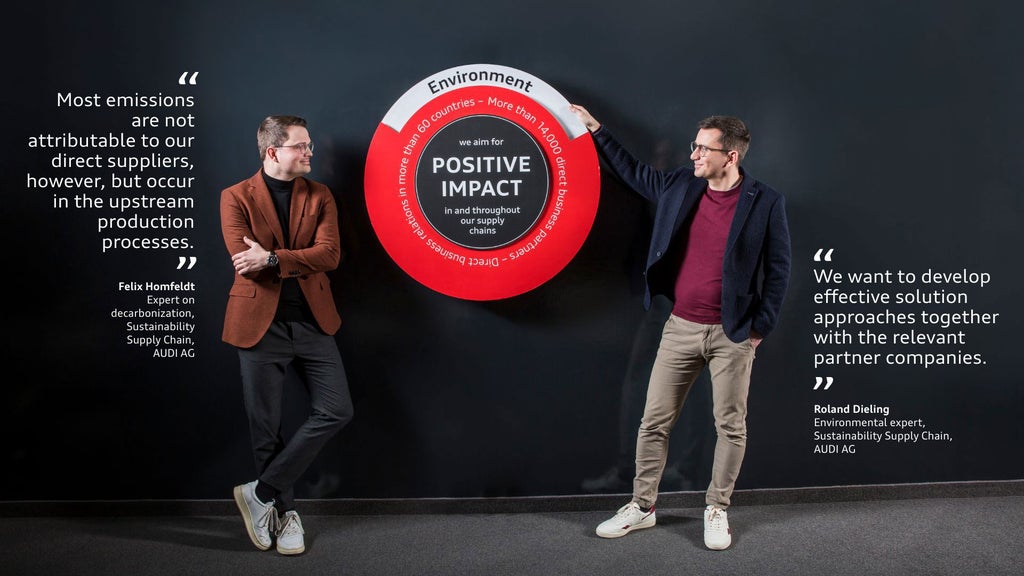
Decarbonization index
More details
On the road to climate-friendly mobility, Audi is using the decarbonization index* (DCI), which is a strategic indicator for reducing CO₂ for all brands in the Volkswagen Group. The DCI factors in the entire value chain – from the extraction of raw materials and production to the provision of fuel and electricity and vehicle emissions through to recycling.
A further focal point in the environment field of action is the environmentally compatible and efficient use of resources like water.
Regional differences in the availability of clean water pose a particular challenge in developing a water strategy for the supply chain. Audi therefore pursues a risk-based approach that takes regional availability into account. It analyzes which regions are subject to high levels of water stress and identifies the materials that require particularly large amounts of water to produce. Based on the intersection between these regions and materials, Audi identified hotspots. For these, in the next step, effective solution approaches are to be developed together with the relevant suppliers.
As further proof of its commitment, in January 2023 Audi became the first premium automotive manufacturer to join the Alliance for Water Stewardship. The global network of companies, NGOs and governmental organizations is dedicated to achieving more sustainable and responsible use of water as a resource in collaboration with the relevant stakeholders.
